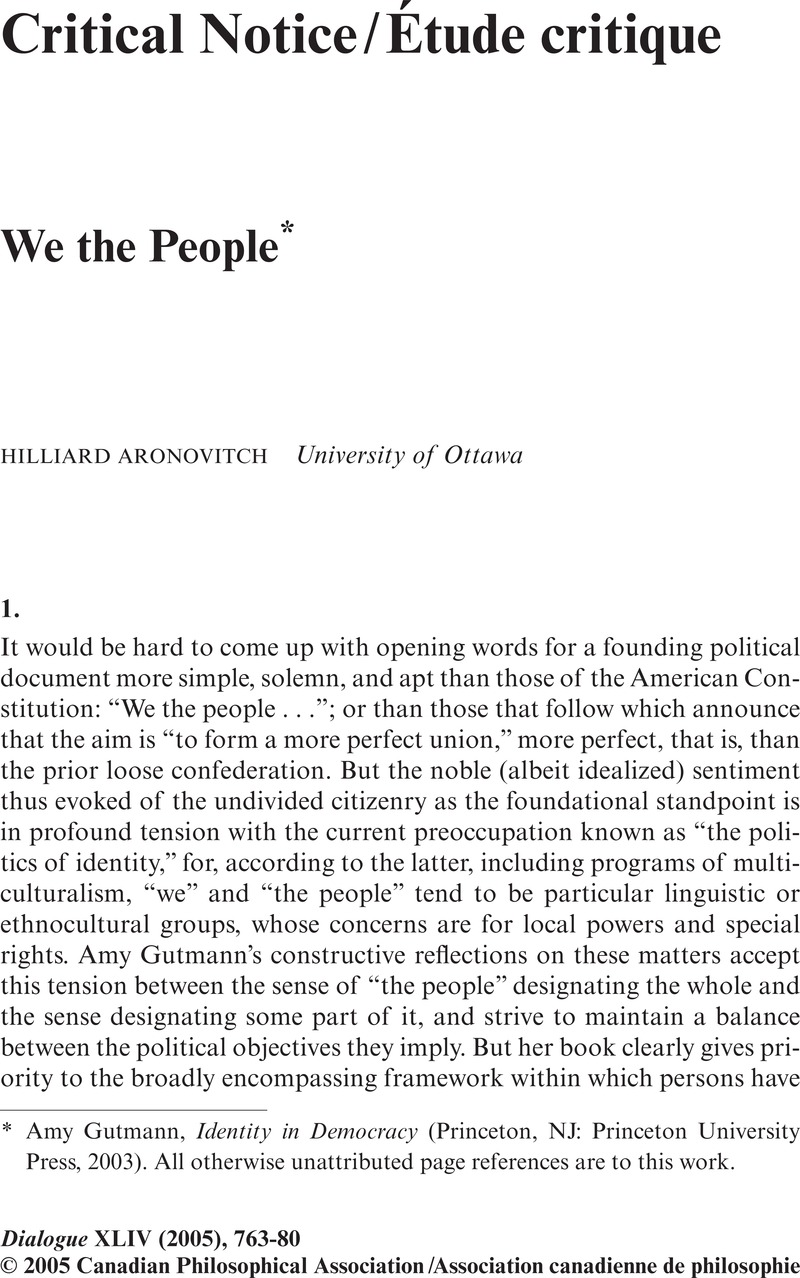No CrossRef data available.
Article contents
We the People*
Published online by Cambridge University Press: 27 April 2009
Abstract

- Type
- Critical Notice/Étude critique
- Information
- Dialogue: Canadian Philosophical Review / Revue canadienne de philosophie , Volume 44 , Issue 4 , Fall 2005 , pp. 763 - 780
- Copyright
- Copyright © Canadian Philosophical Association 2005
References
Notes
1 See Kymlicka, Will's Multicultural Citizenship (New York: Oxford University Press, 1995)Google Scholar and Politics in the Vernacular: Nationalism, Multiculturalism, and Citizenship (New York: Oxford University Press, 2001)Google Scholar, and Taylor, Charles et al. , Multiculturalism: Examining the Politics of Recognition, edited by Gutmann, Amy (Princeton, NJ: Princeton University Press, 1994).Google Scholar
2 See Benhabib, Seyla, The Claims of Culture: Equality and Diversity in the Global Era (Princeton, NJ: Princeton University Press, 2002)Google Scholar; Levy, Jacob T., The Multiculturalism of Fear (New York: Oxford University Press, 2000)CrossRefGoogle Scholar; Parekh, Bhikhu, Rethinking Multiculturalism: Cultural Diversity and Political Theory (Basingstoke: Macmillan, 2000)Google Scholar; and Shachar, Ayelet, Multicultural Jurisdictions: Cultural Differences and Women's Rights (New York: Cambridge University Press, 2001).CrossRefGoogle Scholar
3 Barry, Brian, Culture and Equality (Cambridge, MA: Harvard University Press, 2002).Google Scholar
4 See Benhabib, Seyla, The Claims of CultureGoogle Scholar and “Toward a Deliberative Model of Democratic Legitimacy,” in Democracy and Difference: Contesting the Boundaries of the Political, edited by Benhabib, S. (Princeton, NJ: Princeton University Press, 1996), pp. 67–94Google Scholar; Cohen, Joshua, “Procedure and Substance in Deliberative Democracy,” in Democracy and Difference, pp. 95–119Google Scholar; and Habermas, Jürgen, Between Facts and Norms: Contributions to a Discourse Theory of Law and Democracy, translated by Rehg, William (Cambridge, MA: MIT Press, 1996).Google Scholar
5 Gutmann, surprisingly, at one point (p. 116) includes economic class in the list of identity groups; but never really takes up that categorization, and the main arguments would presumably be muddied by doing so.
6 See Barry, , Culture and Equality, chap. 8.Google Scholar
7 Santa Clara Pueblo v. Martinez, 436 US 49 (1978).Google Scholar
8 Kymlicka, , Multicultural Citizenship, pp. 164–67.Google Scholar
9 Margalit, Avishai and Halbertal, Moshe, “Liberalism and the Right to Culture,” Social Research, 61, 3 (1994): 490–510.Google Scholar
10 See Barry, , Culture and Equality, p. 65.Google Scholar
11 Ibid., p. 61.
12 Thompson, Dennis and Gutmann, Amy, Democracy and Disagreement (Cambridge, MA: Harvard University Press, 1996)Google Scholar; see also their “Deliberative Democracy Beyond Process,” Journal of Political Philosophy, 10, 2 (2002): 153–74.Google Scholar
13 See Thompson, and Gutmann, , Democracy and Disagreement, pp. 63–69Google Scholar; also see Gutmann, Amy, “Civic Education and Social Diversity,” Ethics, 105, 3 (1995): 557–79.CrossRefGoogle Scholar
14 Mozert v. Hawkins County Board of Education, 827 F. 2d 1058 (6th Circuit 1987).Google Scholar
15 See Delgamuukw v. British Columbia, [1997] 3 S.C.R. 1010Google Scholar, and R. v. Marshall [1999] 3 S.C.R. 507.Google Scholar
16 Nixon v. Condon, 1286 US 73 (1932).Google Scholar
17 Roberts v. United States Jaycees, 468 US 609 (1984).Google Scholar
18 Boy Scouts of America v. Dale, 530 US 640 (2000).Google Scholar
19 For follow-up as to local governments and charities disassociating from the Boy Scouts see, Landau, Joseph, “Reversal of Fortune,” The New Republic Online: https://ssl.tnr.com/p/docsub.mhtml?;=exxpress&s=landau031104.Google Scholar
20 Employment Division, Department of Human Resources of Oregon v. Smith, 494 US 872 (1990).Google Scholar


